YOSHIO HARADA:
THE FACE OF PAIN & BEAUTY
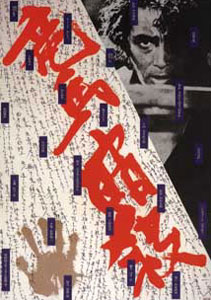 Yoshio Harada became known as "the samurai for the '70s," one of the few new stars to leave a decisive mark on the samurai genre in a decade when relatively few samurai films were being made & many regarded the golden age of Japanese cinema as over.
Yoshio Harada became known as "the samurai for the '70s," one of the few new stars to leave a decisive mark on the samurai genre in a decade when relatively few samurai films were being made & many regarded the golden age of Japanese cinema as over.
That first flush of fame by no means faded as he continues to this day to be a major draw. He received the Japanese Blue Ribbon Award as Best Actor in 1991 for his central role in the splendid samurai film Ronin-gai (1990) & is a repeated winner of the Kinema Jumpo & Mainichi Film Concours awards. He was the sword instructor for the protagonist of the woman ninja hit Azumi (2003), & brings dynamism to every film he's in.
In that great first flush of fame in the '70s though, he was such a surprising new face, mixing the scruffiness of Toshiro Mifune with the elegant beauty of a Raizo Ichikawa, which was a combination not formerly seen in jidai-geki but often imitated in Harada's wake
He played the protector of the blind shamisan player in The Ballad of Orin (Hanare goze Orin, 1977). He was Kaji Meiko's tragic love interest in Lady Snowblood: Love Song of Vengeance (Shura-yuki-hime: Urami Renga, 1974). And he played the title role in Kazuo Kuroki's darkly humorous The Assassination of Ryoma (Ryoma ansatsu, 1974), in which Harada truly & wholly represents a modern, youthful rebel as embodied in a revolutionary samurai during the last years of declining feudalism.
Pursued by numerous foes, Ryoma Sakamoto hides in the city of Edo where the peasants & townsfolk seem to have gone mad with their perpetual, spontaneous "eijanaika" movement, a festival riot/celebration of what they assume will be a new era when Japan begins trade with the West.
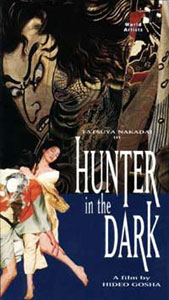 Everything takes place during the last three days of Ryoma's life. The story is both tragic & funny. Part of the roman-poruno (Romantic Pornography) genre which developed in the early '70s, there is a soft-core Decadence about The Assassination of Ryoma which is not so much sexploitation as it is authentically in keeping with the actual Decadence of the last days of the Tokugawa era. Everything takes place during the last three days of Ryoma's life. The story is both tragic & funny. Part of the roman-poruno (Romantic Pornography) genre which developed in the early '70s, there is a soft-core Decadence about The Assassination of Ryoma which is not so much sexploitation as it is authentically in keeping with the actual Decadence of the last days of the Tokugawa era.
Hideo Gosha's Hunter in the Dark (Yami no karyudo, 1979) stars Tatsuya Nakadai as Gomyo Kiyoemon, an oyabun (gangster boss) & leader of an assassin's guild. Gomyo hires a one-eyed yojimbo (samurai bodyguard), Yataro Tanigawa, played by Yoshio Harada. This character is lonely, sad, deeply troubled, & capable of incredible cruelty.
Harada epitomizes the "strong silent type" in this & many of his roles. His quiet presence dominates the screen no matter what other actor he shares a scene with. And holding viewer attention while Nakadai is in a film is quite an achievement in itself.
Yataro suffers from amnesia & the slow unfolding of his past is tense & tragic. In a gory sequence of massive action, one of several samurai he is pitted against recognizes the amnesiac killer. Calling Yataro by name, this opponent cries out, "We're friends! Why this?" Without hestitation, his opponent is slashed into the next world.
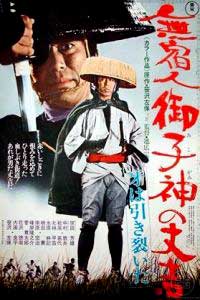 Action fans in the west know Harada best from the Trail of Blood series, in which he plays the drifter (toseinin) Jokichi of Mikogami.
Action fans in the west know Harada best from the Trail of Blood series, in which he plays the drifter (toseinin) Jokichi of Mikogami.
As in Hunter in Darkness, he uses a reverse-grip style, holding his sword one-handed pointed down, with a crouching stance that makes him almost animalistic.
The Trail of Blood films beginning with Trail of Blood 1: Drifter Jokichi of Mikogami (Mushukunin Mikogami no Jokichi: Kiba wa hiki retsu-ita, 1972), had beautifully remastered & subtitled dvd releases in 2006, with a new series title being promulgated, "The Mikogami Trilogy."
The new title is a bit clutzy since "Mikogami" is not the hero's name but his birthplace; & the stories don't take place in Mikogami.
These have stood among my favorite films since they were first imported as subtitled 35 mm prints in the early 70s, & to me they'll always be the Trail of Blood series, just as to me the Sleepy Eyes of Death films will always be the Full Moon Swordsman series, as on the first subtitled film prints to reach America.
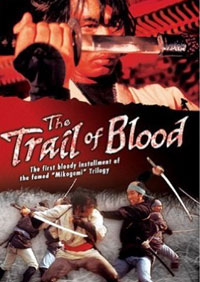 I regard this saga in its entirety as Kazuo Ikehiro's most thorough-going masterpiece, though I'm aware there are those who think less highly of these films than do I. I regard this saga in its entirety as Kazuo Ikehiro's most thorough-going masterpiece, though I'm aware there are those who think less highly of these films than do I.
He was a fine commercial chambara director including for such signal film series as Zatoichi & the Full Moon Swordsman, but it was with Drifter Jokichi he scored a character he understood to the core, with an actor who could make Jokichi real.
This was Ikehiro's dream-project & he put his all into it. Those who have deplored the simplicity of the plot, which amounts to "family got killed, must get revenge, kill kill kill," have brought unet expectations to the saga, & not assessed the films for their actual strengths, as there is much more in them.
Ikehiro's strength as a director of action films, setting him apart from the average, was his ability to frame action as manifestations of character. Even a stoic-visaged figure like Jokichi provides inroads to his psyche by the content of his physical deeds.
The Trail of Blood series is the chronicle of a young wanderer's vengeance against two yakuza gangs & their bosses, plus the boss of a third gang, all of whom our grim hero holds responsible for the murder of his wife & child.
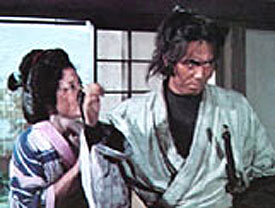 These are cruel films ranking with the Babycart movies in the provocative combination of beauty & gory carnage. These are cruel films ranking with the Babycart movies in the provocative combination of beauty & gory carnage.
Jokichi angered two gangster bosses or oyabuns, Chogoro & Kyubei, over a woman named Okinu (Sanae Kitabayash).
She is an ex-prostitute trying to make a decent living with a little dumpling shop. But she is treated like public property by local gangsters.
She falls for Jokichi & it turns out to be very mutual, but both Chogoro & Kyubei wanted Okinu.
These rival bosses thought they'd have to fight it out with one another for possession of this woman, her personal sentiment that they're both repulsive having no authority. They hadn't counted on Jokichi's intrusion.
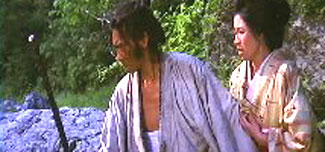 He violently defends her, & they flee to a small village, with Jokichi vowing never again to be violent. He takes up the craft of carving combs for a humble but reliable income. They have a son, & their love strengthens. He violently defends her, & they flee to a small village, with Jokichi vowing never again to be violent. He takes up the craft of carving combs for a humble but reliable income. They have a son, & their love strengthens.
Jokichi adapts to a very retiring life, almost never leaving home, so as not to be spotted by yakuza whose bosses would reward them for killing Jokichi. But he has to set out periodically with the hair ornaments he has made, to sell them to a merchant.
Before he knows he will return home to a dead family, Jokichi is captured by yakuza who demand two of his fingers for having scarred Kyubei's forehead & sundry imagined debts.
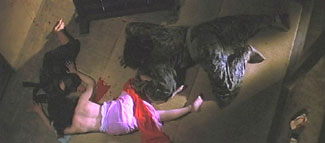 We have no doubt he could kill them all, but he is committed to his family, & to his vow of non-violence. We have no doubt he could kill them all, but he is committed to his family, & to his vow of non-violence.
He is willing to submit to any abuse if it will mean he's forever out of the the gamblers' world & gangsters' interest.
This would be bad enough to just cut the fingers off cleanly, but these men are too sadistic to leave it at that.
He puts his hand on a chopping block, & they smash two fingers with the flat backside of an axe. He bares it as long as he can, then grabs his sword, frightening them considerably, for all that they greatly outnumber him. But he only slices off his mangled fingers, & bows to his tormentors respectfully.
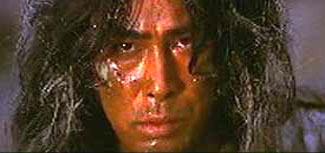 Staggering toward his village, he's captured again, by Chogoro's men, who abuse him further, all but drown him in a mud hole, & pee all over him. Staggering toward his village, he's captured again, by Chogoro's men, who abuse him further, all but drown him in a mud hole, & pee all over him.
Once again he bares all pain & humiliation, as he has a wife & child to consider.
But he afterward discovers his wife raped & murdered, his child killed as well. While he heals physically, emotionally he never will. He lets the nails of the remaining fingers of his right hand grow into sharpened eye-scratching claws, & with sword in his obi belt, sets out on his aptly titled trail of blood.
A falling-apart sedge-hat was never so romantic as in the Trail of Blood films, as the peasant avenger Jokichi in wanderer's hat & cape travels the highways & back roads of blood-drenched adventure.
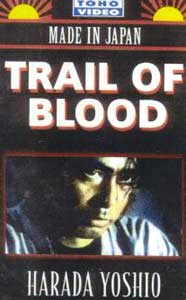 Yoshio Harada plays Jokichi as a man so at odds with his world that he even defies gravity. The character is played with a list to his frame, in a soiled white jacket, & a scowl comingling hatred & misery. Yoshio Harada plays Jokichi as a man so at odds with his world that he even defies gravity. The character is played with a list to his frame, in a soiled white jacket, & a scowl comingling hatred & misery.
His sedgehat, initially fairly intact, film by film becomes increasingly tattered, as irrepairable as his soul. That he never obtains a new one is an outgrowth of his abject self-reliance even in a wanderer's poverty.
To many western viewers these may look like films about a samurai avenger, & several reviews of the subtitled dvd release have called him a samurai avenger. But Jokichi of Mikogami is a one-sword man, whereas samurai carry two swords.
The conventions of Trail of Blood are rooted not in the history of the military class, but in the history of yakuza: gamblers, wanderers, gangsters.
Jokichi was never samurai, but a craftsman who became a toseinin or drifter within the yakuza social network, without gang association, a man on the fringe even among yakuza.
"No socially redeeming value" some have called this unchecked series of bloodbaths. But the beauty of the countryside captured in splendid photography by Kazuo Miyagawa (Kurosawa's cinematographer), the pure romance of the "foot highways" of old Japan, & Takao Watanabe's effective semi-modernistic semi-traditional score.
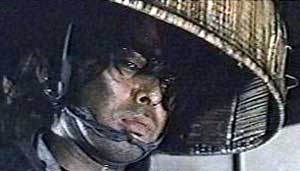 And most especially there is the presence of Yoshio Harada as the brooding, depressed avenger. And most especially there is the presence of Yoshio Harada as the brooding, depressed avenger.
Harda gives Trail of Blood 1 & the two follow-up films an essence of tragedy that partially negates the mere "mass killing is fun" aspect. Trail of Blood is a veritable essay on revenge, stripped down to its essentials.
Additionally it is a film of extraordinary pictorial beauty, & part of appreciating what Kazuo Ikehiro has achieved is in comprehending & absorbing the aesthetics of quiet moments, of Jokichi standing beneath the eaves of a roadside shrine waiting out the rain, of all but stationary shots of a wanderer in the distance
striding the highways.
In all his films for Toho Studios, Harada's gloomy acting style is in the main changeless. Some might complain of his limited range. Yet he really is unexcelled at what he does, with an image & style strictly his own. And it's a sure bet that any film in which he appears will have at least one tremendous if familiar performance.
copyright © by Paghat the Ratgirl
|
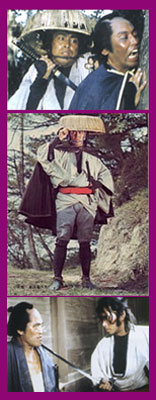

 Everything takes place during the last three days of Ryoma's life. The story is both tragic & funny. Part of the roman-poruno (Romantic Pornography) genre which developed in the early '70s, there is a soft-core Decadence about The Assassination of Ryoma which is not so much sexploitation as it is authentically in keeping with the actual Decadence of the last days of the Tokugawa era.
Everything takes place during the last three days of Ryoma's life. The story is both tragic & funny. Part of the roman-poruno (Romantic Pornography) genre which developed in the early '70s, there is a soft-core Decadence about The Assassination of Ryoma which is not so much sexploitation as it is authentically in keeping with the actual Decadence of the last days of the Tokugawa era.
 I regard this saga in its entirety as Kazuo Ikehiro's most thorough-going masterpiece, though I'm aware there are those who think less highly of these films than do I.
I regard this saga in its entirety as Kazuo Ikehiro's most thorough-going masterpiece, though I'm aware there are those who think less highly of these films than do I. These are cruel films ranking with the Babycart movies in the provocative combination of beauty & gory carnage.
These are cruel films ranking with the Babycart movies in the provocative combination of beauty & gory carnage. He violently defends her, & they flee to a small village, with Jokichi vowing never again to be violent. He takes up the craft of carving combs for a humble but reliable income. They have a son, & their love strengthens.
He violently defends her, & they flee to a small village, with Jokichi vowing never again to be violent. He takes up the craft of carving combs for a humble but reliable income. They have a son, & their love strengthens. We have no doubt he could kill them all, but he is committed to his family, & to his vow of non-violence.
We have no doubt he could kill them all, but he is committed to his family, & to his vow of non-violence. Staggering toward his village, he's captured again, by Chogoro's men, who abuse him further, all but drown him in a mud hole, & pee all over him.
Staggering toward his village, he's captured again, by Chogoro's men, who abuse him further, all but drown him in a mud hole, & pee all over him. Yoshio Harada plays Jokichi as a man so at odds with his world that he even defies gravity. The character is played with a list to his frame, in a soiled white jacket, & a scowl comingling hatred & misery.
Yoshio Harada plays Jokichi as a man so at odds with his world that he even defies gravity. The character is played with a list to his frame, in a soiled white jacket, & a scowl comingling hatred & misery. And most especially there is the presence of Yoshio Harada as the brooding, depressed avenger.
And most especially there is the presence of Yoshio Harada as the brooding, depressed avenger.